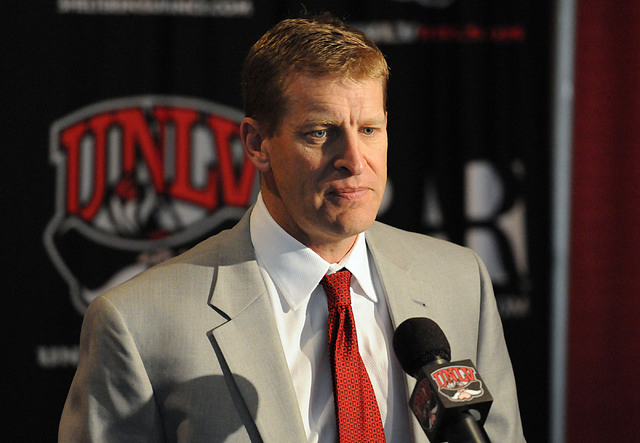UNLV faces possible bowl ban
Just when UNLV’s football program appeared to be building momentum after making the postseason for the first time in 13 years, the Rebels could get hit with penalties by the NCAA that might include a bowl ban.
UNLV might fall short of the minimum academic standard to be eligible for a bowl appearance when the NCAA releases the Academic Progress Rate, or APR, in June.
When asked whether the football program was in danger of facing NCAA penalties, UNLV athletic director Tina Kunzer-Murphy released a statement that read: “We are engaged in the APR process ahead of the June release by the NCAA. It’s an on-going process and there is nothing definitive to report at this point. We will have no further comment until the process is complete.”
Football coach Bobby Hauck was not made available for comment on this issue.
The APR uses a formula combining whether student-athletes for each sport were enrolled in school and eligible in both semesters. A perfect score would be 1,000, and the average school nationwide was 974 last year.
A school’s APR must average at least 930 over the past four academic years or 940 over the past two to be eligible for postseason play, such as a bowl or tournament appearance.
“In very simple language … it just means the school didn’t meet the requirement to compete in NCAA championships,” NCAA spokeswoman Meghan Durham wrote in an email. “Just as teams must win in competition to be eligible for championships, they now must also achieve in the classroom.”
UNLV had a four-year APR average of 932 when the numbers came out last June, but according to the NCAA website, that included an 891 mark in the 2011-12 academic year, the most recent reporting period. The team had reached 947 averages in each of the two previous years.
In comparison, the UNLV men’s basketball team had an average of 965 in the last report.
Last year, 18 Division I schools faced postseason bans in various sports, including three in football and six in men’s basketball. The biggest name to face a ban because of low APR was Connecticut men’s basketball in 2013, although the Huskies improved their scores and were eligible for the NCAA Tournament this year.
The NCAA instituted the APR guidelines beginning with the 2004-2005 academic year, though ratings then were based on a two-year average.
The NCAA has three sets of penalties in addition to a postseason ban for those schools that fall short of meeting the requirement.
The NCAA, which strengthened its APR requirements to compete in the postseason beginning with the 2014-15 academic year, uses a three-level penalty structure:
• Reduction of weekly practice time from 20 to 16 hours. The other four hours would go to what the NCAA site calls “academic activities.”
• What the NCAA terms “competition reductions” that could be enforced in or out of season and would be in addition to the practice-time penalty. The site does not specify the kinds of reductions.
• The NCAA had an array of choices from suspending a coach to restricting the school’s membership in the organization. This penalties would apply if a school falls short of the APR minimum average three years in a row.
UNLV football had been penalized twice for low APR. The Rebels lost three scholarships after posting a 901 average in the 2005-06 academic year, and they lost one scholarship after posting a 905 the following year. But UNLV had improved its APR under previous coach Mike Sanford after it was hit with those scholarship losses.
If UNLV is penalized in June, the timing could not be much worse.
The Rebels went 7-6 last season and appeared in the Heart of Dallas Bowl, where they lost 36-14 to North Texas. That was their first winning season and bowl appearance since 2000.
Hauck, who will be entering his fifth season, appeared to have turned around the program and in January, the state Board of Regents approved a new three-year contract and $200,000 raise. His salary now is $700,000.
When Kunzer-Murphy and Hauck learned the program might be in trouble is uncertain.
Neither the athletic director nor the coach want to go into next season knowing a bowl appearance isn’t possible. They probably would take almost any other kind of penalty rather than disrupt the seeming momentum built from last season.
Contact reporter Mark Anderson at manderson@reviewjournal.com or 702-387-2914. Follow him on Twitter @markanderson65.

















